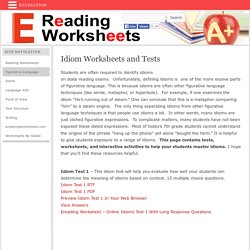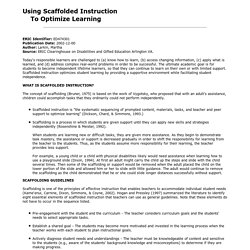

Idioms Handouts and Worksheets for ESL Classes. Idiom Worksheets. CCSS.ELA-Literacy.CCRA.R.4 – Interpret words and phrases as they are used in a text, including determining technical, connotative, and figurative meanings, and analyze how specific word choices shape meaning or tone.CCSS.ELA-Literacy.CCRA.L.5 – Demonstrate understanding of figurative language, word relationships, and nuances in word meanings.

ELA Standards: Literature ELA Standards: Language View SourceCommon Core Lesson and Unit PlansUnderstanding Common Core State Standards. Power Outages — What to do? Adobe Acrobat Version (PDF 895 KB) Our partners This publication was produced by Public Safety Canada in collaboration with: Canada Mortgage and Housing Corporation (CMHC), Canadian Red Cross, and St.

John Ambulance. An electronic version of this brochure is available at www.GetPrepared.ca. Please note: Publications are not available in regular print format. © Her Majesty the Queen in Right of Canada 2011 Cat. Introduction Most power outages will be over almost as soon as they begin, but some can last much longer – up to days or even weeks. During a power outage, you may be left without heating/air conditioning, lighting, hot water, or even running water. You can greatly lessen the impact of a power outage by taking the time to prepare in advance.
Find out what to do before, during, and after a power outage. Planning for a power outage will also help prepare you for other types of emergencies. Step 1: Know the risks and get prepared Preparing Your Home During A Power Outage Basic emergency kit. Learning and Teaching Centre : : Teaching, Testing & Self-Evaluation Resources. Excellent instructors are always looking for ways to enhance student learning through effective teaching.

These resources provide tools for you to reflect on and improve your teaching, and provide particular teaching techniques. BCIT Learning and Teaching Centre Job Aids Being clear on expectations and comprehensively preparing lessons reduces poor student behaviour proactively. Ensure to model respectful behaviour and treat students as capable, goal-oriented, self-directed adults. Students often decide in the first few classes if they like the content, delivery, instructor, and other students, so set your tone and expectations early on -- first impressions count!
Remember too, you can request confidential observation and feedback from a colleague, or through the Learning and Teaching Centre's Small Group Instructional Feedback17 [PDF]. BCIT Policies Other BCIT Resources. Crafting the ePerfect Textbook - Community. Consumer Protection Brochures - Ministry of Consumer Services, Ontario, Canada. Using Scaffolded Instruction To Optimize Learning. ERIC Identifier: ED474301Publication Date: 2002-12-00 Author: Larkin, Martha Source: ERIC Clearinghouse on Disabilities and Gifted Education Arlington VA.Today's responsible learners are challenged to (a) know how to learn, (b) access changing information, (c) apply what is learned, and (d) address complex real-world problems in order to be successful.

The ultimate academic goal is for students to become independent lifetime learners, so that they can continue to learn on their own or with limited support. Scaffolded instruction optimizes student learning by providing a supportive environment while facilitating student independence.WHAT IS SCAFFOLDED INSTRUCTION? The concept of scaffolding (Bruner, 1975) is based on the work of Vygotsky, who proposed that with an adult's assistance, children could accomplish tasks that they ordinarily could not perform independently. Books and Articles by Stephen D Krashen. Huh Means the Same Thing in Every Language - Olga Khazan. How the dynamics of human conversation gave shape to a word that knows no boundaries.

You may not be able to order a beer in Iceland, but misunderstand someone as they’re describing the regional elf lore, and you’re in luck. The expression “huh?” Is practically universal, according to a recent study published in the journal PLoS One by researchers from the Max Planck Institute for Psycholinguistics in Nijmegen, the Netherlands. Here’s why this is so unusual. Most languages sound dramatically different from each other because words aren’t tied to what they stand for—dog and chien both represent a four-legged canine, for example—and each language is basically limited to a finite number of possible sound combinations.
“The likelihood that there are universal words is extremely small,” the authors write. “Huh” may sound like just an interjection, like a grunt or cry. “'Huh? ' For Dingemanse, the research shows that, "language has all these extremely important social roles.